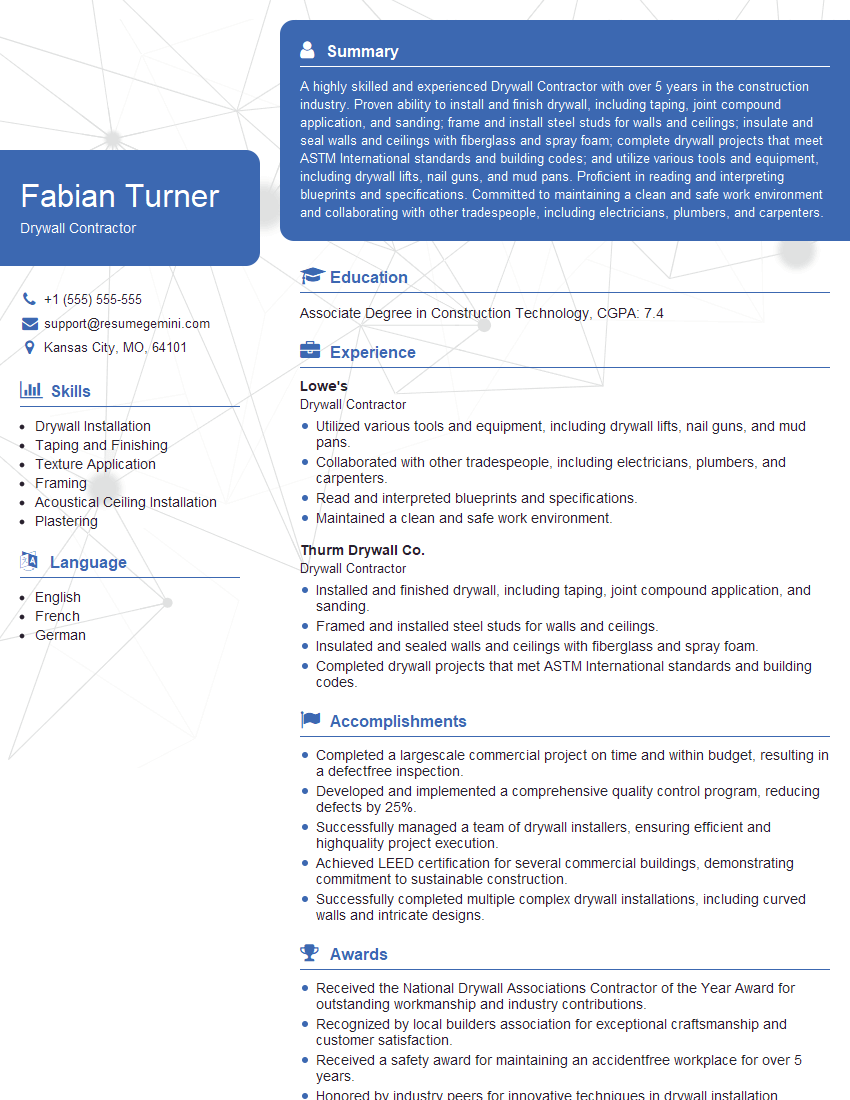Are you a seasoned Drywall Contractor seeking a new career path? Discover our professionally built Drywall Contractor Resume Template. This time-saving tool provides a solid foundation for your job search. Simply click “Edit Resume” to customize it with your unique experiences and achievements. Customize fonts and colors to match your personal style and increase your chances of landing your dream job. Explore more Resume Templates for additional options.

Fabian Turner
Drywall Contractor
Summary
A highly skilled and experienced Drywall Contractor with over 5 years in the construction industry. Proven ability to install and finish drywall, including taping, joint compound application, and sanding; frame and install steel studs for walls and ceilings; insulate and seal walls and ceilings with fiberglass and spray foam; complete drywall projects that meet ASTM International standards and building codes; and utilize various tools and equipment, including drywall lifts, nail guns, and mud pans. Proficient in reading and interpreting blueprints and specifications. Committed to maintaining a clean and safe work environment and collaborating with other tradespeople, including electricians, plumbers, and carpenters.
Education
Associate Degree in Construction Technology
March 2019
Skills
- Drywall Installation
- Taping and Finishing
- Texture Application
- Framing
- Acoustical Ceiling Installation
- Plastering
Work Experience
Drywall Contractor
- Utilized various tools and equipment, including drywall lifts, nail guns, and mud pans.
- Collaborated with other tradespeople, including electricians, plumbers, and carpenters.
- Read and interpreted blueprints and specifications.
- Maintained a clean and safe work environment.
Drywall Contractor
- Installed and finished drywall, including taping, joint compound application, and sanding.
- Framed and installed steel studs for walls and ceilings.
- Insulated and sealed walls and ceilings with fiberglass and spray foam.
- Completed drywall projects that met ASTM International standards and building codes.
Accomplishments
- Completed a largescale commercial project on time and within budget, resulting in a defectfree inspection.
- Developed and implemented a comprehensive quality control program, reducing defects by 25%.
- Successfully managed a team of drywall installers, ensuring efficient and highquality project execution.
- Achieved LEED certification for several commercial buildings, demonstrating commitment to sustainable construction.
- Successfully completed multiple complex drywall installations, including curved walls and intricate designs.
Awards
- Received the National Drywall Associations Contractor of the Year Award for outstanding workmanship and industry contributions.
- Recognized by local builders association for exceptional craftsmanship and customer satisfaction.
- Received a safety award for maintaining an accidentfree workplace for over 5 years.
- Honored by industry peers for innovative techniques in drywall installation.
Certificates
- OSHA 10-Hour Construction Safety
- EPA Lead-Safe Work Practices
- NADCA Certified Air Systems Cleaning Specialist
- NAHB Certified Green Professional
Career Expert Tips:
- Select the ideal resume template to showcase your professional experience effectively.
- Master the art of resume writing to highlight your unique qualifications and achievements.
- Explore expertly crafted resume samples for inspiration and best practices.
- Build your best resume for free this new year with ResumeGemini. Enjoy exclusive discounts on ATS optimized resume templates.
How To Write Resume For Drywall Contractor
- Highlight your experience and skills in your resume summary.
- Use keywords that potential employers will be searching for.
- Showcase your ability to work independently and as part of a team.
- Proofread your resume carefully for any errors before submitting it.
- Consider getting your resume reviewed by a professional.
Essential Experience Highlights for a Strong Drywall Contractor Resume
- Install and finish drywall according to blueprints and specifications.
- Tape and finish drywall to create a smooth surface.
- Apply texture to drywall to create a desired appearance.
- Frame and install steel studs to create walls and ceilings.
- Insulate and seal walls and ceilings to improve energy efficiency.
- Read and interpret blueprints and specifications to ensure proper installation.
- Collaborate with other tradespeople, including electricians, plumbers, and carpenters.
Frequently Asked Questions (FAQ’s) For Drywall Contractor
What are the job duties of a Drywall Contractor?
Drywall Contractors are responsible for installing and finishing drywall in residential and commercial buildings. They also frame and install steel studs for walls and ceilings, insulate and seal walls and ceilings, and complete drywall projects that meet ASTM International standards and building codes.
What are the qualifications for becoming a Drywall Contractor?
Most Drywall Contractors have a high school diploma or equivalent, and some may have an associate degree in construction technology. They typically learn the trade through on-the-job training or an apprenticeship program.
What are the career prospects for Drywall Contractors?
Drywall Contractors can advance to become supervisors or project managers. They may also start their own businesses.
What is the average salary for a Drywall Contractor?
The average salary for a Drywall Contractor is $45,000 per year.
What are the working conditions for Drywall Contractors?
Drywall Contractors typically work indoors in a variety of settings, including residential and commercial buildings. They may work long hours, including overtime, and they may be exposed to dust and other hazardous materials.
What are the benefits of working as a Drywall Contractor?
Drywall Contractors can enjoy a variety of benefits, including a competitive salary, health insurance, and paid time off. They also have the opportunity to work with a variety of people and learn new skills.
What are the challenges of working as a Drywall Contractor?
Drywall Contractors can face a variety of challenges, including working in dusty and hazardous conditions, working long hours, and dealing with difficult customers.
What are the most important skills for a Drywall Contractor?
The most important skills for a Drywall Contractor include the ability to install and finish drywall, frame and install steel studs, insulate and seal walls and ceilings, and read and interpret blueprints and specifications.